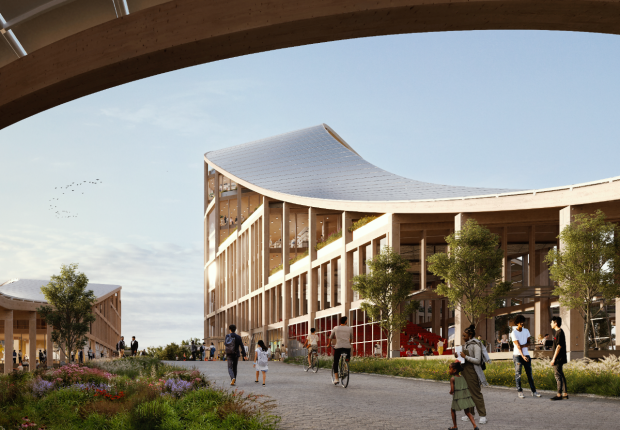New York University Takes Part In Consortium Selected By New York City To Build A World-leading Climate Center On Governors Island
NYU is among the consortium of leading institutions selected by Mayor Eric Adams and The Trust for Governors Island earlier this week to establish a world-leading climate solutions campus on Governors Island. The consortium, called The New York Climate Exchange and composed of top universities, environmental justice organizations, businesses, government groups, and the philanthropic community, is expected to open its first facilities on the island in New York harbor by 2028.
The group is led by Stony Brook University; it will launch a state-of-the-art international educational center for developing and deploying scientific strategies to fight the climate crisis, while also acting as a hub for New Yorkers to benefit from the rapidly evolving green economy.
“New York University is proud to join the New York Climate Exchange and along with our partners help meet the great global challenge of our time—climate change,” said NYU President Andrew Hamilton. “As a university whose fate is inextricably tied to the city, we are so pleased to call home, NYU takes its role and responsibility as a model of sustainability seriously, and looks forward to having our scholars and students contribute to this local innovative research and educational hub with a markedly global reach. We thank The Trust for Governors Island and New York City for their leadership to make this transformative initiative a reality.”
“NYU is excited to be part of the New York Climate Exchange under Stony Brook University’s leadership,” said Stacie Bloom, NYU’s vice provost for research and chief research officer. “We believe this is a once-in-a-lifetime opportunity that will have a lasting impact. The Exchange brings together partners from academia, industry, government, and local and global communities across several disciplines because only through collaboration can we find solutions that will address the challenge of climate change for generations to come. Across our NYC-based and global campuses, NYU researchers and students are poised to join The Exchange to innovate for a future that is greener, more sustainable and more equitable.”
“The New York Climate Exchange rightly identifies climate change as the defining challenge of our time, cementing NYC’s place as a top leader in climate action and engagement,” said Cecil Scheib, NYU’s chief sustainability officer. “Its all-electric, Living Building Challenge-certified buildings, raised above the flood line, will demonstrate for all what a climate-secure future can look like. The Exchange will truly walk the walk, while developing innovative and equitable climate solutions that will serve as a blueprint for both NYC and the world.”
Other partners include Pratt Institute, Pace University, the City University of New York, SUNY Maritime College, The Museum of the City of New York, Brookhaven National Labs and IBM, as well as research institutions such as Georgia Tech, Duke University, Rochester Institute of Technology and the University of Oxford. Additional partners of The Exchange are the Simons Foundation, one of the largest charitable organizations in the United States; social justice and local advocacy groups such as GOLES, The Point and WeACT for Justice; treasured New York institutions including the American Museum of Natural History; and research and business leaders such as Boston Consulting Group and Moody’s.
Designed by renowned architectural firm, Skidmore, Owings & Merrill—in collaboration with Mathews Nielsen Landscape Architects, BuroHappold, and Langan Engineering—The Exchange’s carbon-neutral campus will serve as a model for sustainability that complements the natural landscape of Governors Island, situated in New York Harbor.
Key elements of The New York Climate Exchange include:
An engaging and interactive living laboratory with 400,000-square-feet of green-designed building space, including research labs, classroom space, exhibits, greenhouses, mitigation technologies, and housing facilities, including:
An all-electric powered campus with on-site solar electricity generation and battery storage with net-positive capability to serve the local grid
100 percent of non-potable water demand met with rainwater or treated wastewater collection
95 percent of waste diverted from landfills, making this one of the first sites in the U.S. to achieve True Zero Waste certification
Climate-resilient design of new buildings, all raised to the Design Flood Elevation (DFE) of +18 feet with no basements and living shoreline
All new and renovated buildings will meet the rigorous certification requirements of Living Building Challenge, and will be the first to achieve this certification in NYC
A Research and Technology Accelerator that will source and nurture ideas, projects, and new ventures dedicated to solving the climate crisis.
Workforce development opportunities for communities disproportionately affected by climate change—hosting 6,000 green job trainees annually—ensuring that New Yorkers most affected by climate change are well-positioned for new green economy jobs.
Partnerships and collaborative grant opportunities with community-based organizations already working to mitigate the impacts of climate change.
A Citizens’ Advisory Council, composed of key local stakeholders to ensure that community voices are heard and amplified as The Exchange develops and implements new climate solutions, including those that affect low-income communities of color.
A long-term plan for self-sufficient development that goes “beyond zero” toward net positive sustainability.
Academic and community programs that prepare students at every level for careers focused on climate change solutions and environmental justice, encompassing hands-on learning, a semester “abroad” on Governors Island, fellowship and internship programs and continuing education.
Founded in 1831, NYU is one of the world’s foremost research universities (with more than $1 billion per year in research expenditures) and is a member of the selective Association of American Universities. NYU has degree-granting university campuses in New York, Abu Dhabi, and Shanghai; has 12 other global academic sites, including London, Paris, Florence, Tel Aviv, Buenos Aires, and Accra; and both sends more students to study abroad and educates more international students than any other U.S. college or university. Through its numerous schools and colleges, NYU is a leader in conducting research and providing education in the arts and sciences, law, medicine, business, dentistry, education, nursing, the cinematic and performing arts, music and studio arts, public administration, social work, and professional studies, among other areas.

